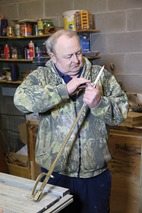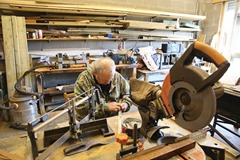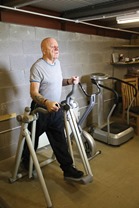A helping hand in later years
 Peter Cheney visits Harryville Men’s Shed to find out how it helps older men enjoy more active and healthy lives and gives them a chance to keep using their practical skills.
Peter Cheney visits Harryville Men’s Shed to find out how it helps older men enjoy more active and healthy lives and gives them a chance to keep using their practical skills.
After a lifetime on the factory floor or the building site, many men in later life can think of nothing worse than idling away their days. That’s where the idea of a men’s shed comes into its own by giving retired and semi-retired men a place to socialise, get fit, make things and to generally be encouraged and helped.
Harryville Men’s Shed, on the outskirts of Ballymena, has been doing just that for the last two years. Community volunteer Denver McMeekin explains: “We have a designated space here for men to come and share experiences, share life skills, share social skills, and we’re here and open to anybody who has maybe been laid off through no fault of their own.”
For example, the closure of the JTI/Gallaher factory in the town will result in around 400 men losing their jobs in the next few years. Many of them will be middle-aged and will have spent their whole careers working with machinery.
The Harryville Partnership was formed back in 2003 and every project which it initially set up “seemed to bring in a lot of females” e.g. tea dances, coffee mornings. Women also made up the youth club volunteers. “We said: ‘No, we need something here for men.’ So basically we put the feelers out [and] we put it out in the newsletter that we were interested in starting a men’s group.”
A meeting was called in September 2012 for anyone who wanted to be part of the group. Fifteen men turned up and the group subsequently obtained funding from the Department for Social Development’s Neighbourhood Renewal programme.
The money has been used to purchase tools and personal protection equipment and also for training. The group is now keen to source another tranche of funding, for the next three years. Their handiwork includes pens, key rings, bird boxes and garden planters, and even replica rifles for historical re-enactments.
Denver finds that the needs of the men whom the centre aims to help are “changing every day” because of austerity in the economy: “Pensions aren’t paying for what they used to pay for” and while home heating prices have recently decreased, pensioners experienced four years where it was hard to heat their homes or eat properly: “Sometimes they didn’t eat at all.”
Domestic violence affects men as well as women. In some cases, the man puts on a “brave face” as the breadwinner and the head of the house “and when they go behind closed doors, it can be sheer hell and torture for them.” Husbands will often stay because of the vows that they took at marriage many years previously. Men are sometimes afraid to “come out of their comfort zone” and feel that they need a good reason to leave the house. If they cannot articulate that reason, they can become stressed and anxious.
“Welfare reform is destroying the working man, it definitely is,” Denver comments. By this, he is referring to welfare in its broadest sense i.e. the free or generous entitlements which a previous generation expected. “They’ve held back on the water rates. They’ve held back on the bedroom tax but that will come in. They’re only waiting for the right opportunity to bring it in.”
Ballee Pharmacy is located a few doors down from the men’s shed and pharmacist Stephen Burns regularly calls in to talk to the men about how to look after their health more effectively.
He explains: “The project is to encourage better health amongst the men just through education, talking about the various topics, giving men an opportunity to talk about their own health as well, and to support each other. The other thing is that they can ‘ask a pharmacist’ so we try to point them in the right direction and help where we can as well.”
Stephen wants to “make people aware of what a useful resource a community pharmacy can be” and hopes to see the men becoming ‘health champions’ in their area i.e. being able to point their friends in the right direction when they have health problems.
A former builder, Geordie starts his morning at the centre with 50 minutes on the running machine and then turns his hand to “a bit of labouring.” Without the centre, he would still be out and about trimming gardens and helping other pensioners but he thinks that it adds something by getting people out of the house.
Many people “just retire” mentally when they leave work: “Once they’ve finished, they don’t look out the door. Here, pensioners have a chance to make those summer seats. So they’re doing something. So their mind’s working, their mind’s not retired.”
Geordie sees an inactive life as a major cause for dementia with too many people spending all their time at home with many of them seeing their health fail and ending up in hospital.
Instead, he’s “out every morning at seven” with a lie-in to 9am on Sundays: “People can come out and do some wee thing in here, even
to get the morning in to 12 o’clock or one o’clock. That’s very good.”
“When I retired three years ago, I was sitting about the house,” Andy relates. For about six months, he was “sitting watching the TV, going to bed, getting up, watching TV, raiding the fridge” before he got involved along with a friend in helping out at the Ballymena Services Club.
While he previously put on weight at home through inactivity, he has since put on weight by building up muscle through exercise. “This opened and the two of us started coming down here,” he adds. After working on the fitness machines, they sweep the floor if that’s needed and do other odd jobs around the place. He sometimes goes for a walk afterwards.
“It means that I’m not sitting about the house all day. It means that I’m not under her feet. It means that, instead of lying awake half the night, you’re sleeping because you’re up there [earlier] and you’re getting a wee bit of energy going.”









